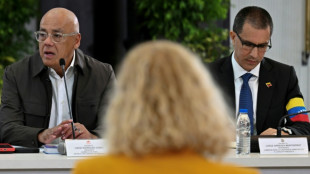
-
 UK royal finances in spotlight after Andrew's downfall
UK royal finances in spotlight after Andrew's downfall
-
Diplomatic shift and elections see Armenia battle Russian disinformation

-
 Undercover probe finds Australian pubs short-pouring beer
Undercover probe finds Australian pubs short-pouring beer
-
Epstein fallout triggers resignations, probes

-
 The banking fraud scandal rattling Brazil's elite
The banking fraud scandal rattling Brazil's elite
-
Party or politics? All eyes on Bad Bunny at Super Bowl

-
 Man City confront Anfield hoodoo as Arsenal eye Premier League crown
Man City confront Anfield hoodoo as Arsenal eye Premier League crown
-
Patriots seek Super Bowl history in Seahawks showdown

-
 Gotterup leads Phoenix Open as Scheffler struggles
Gotterup leads Phoenix Open as Scheffler struggles
-
In show of support, Canada, France open consulates in Greenland

-
 'Save the Post': Hundreds protest cuts at famed US newspaper
'Save the Post': Hundreds protest cuts at famed US newspaper
-
New Zealand deputy PM defends claims colonisation good for Maori

-
 Amazon shares plunge as AI costs climb
Amazon shares plunge as AI costs climb
-
Galthie lauds France's remarkable attacking display against Ireland

-
 Argentina govt launches account to debunk 'lies' about Milei
Argentina govt launches account to debunk 'lies' about Milei
-
Australia drug kingpin walks free after police informant scandal

-
 Dupont wants more after France sparkle and then wobble against Ireland
Dupont wants more after France sparkle and then wobble against Ireland
-
Cuba says willing to talk to US, 'without pressure'

-
 NFL names 49ers to face Rams in Aussie regular-season debut
NFL names 49ers to face Rams in Aussie regular-season debut
-
Bielle-Biarrey sparkles as rampant France beat Ireland in Six Nations

-
 Flame arrives in Milan for Winter Olympics ceremony
Flame arrives in Milan for Winter Olympics ceremony
-
Olympic big air champion Su survives scare

-
 89 kidnapped Nigerian Christians released
89 kidnapped Nigerian Christians released
-
Cuba willing to talk to US, 'without pressure'

-
 Famine spreading in Sudan's Darfur, UN-backed experts warn
Famine spreading in Sudan's Darfur, UN-backed experts warn
-
2026 Winter Olympics flame arrives in Milan

-
 Congo-Brazzaville's veteran president declares re-election run
Congo-Brazzaville's veteran president declares re-election run
-
Olympic snowboard star Chloe Kim proud to represent 'diverse' USA

-
 Iran filmmaker Panahi fears Iranians' interests will be 'sacrificed' in US talks
Iran filmmaker Panahi fears Iranians' interests will be 'sacrificed' in US talks
-
Leicester at risk of relegation after six-point deduction

-
 Deadly storm sparks floods in Spain, raises calls to postpone Portugal vote
Deadly storm sparks floods in Spain, raises calls to postpone Portugal vote
-
Trump urges new nuclear treaty after Russia agreement ends

-
 'Burned in their houses': Nigerians recount horror of massacre
'Burned in their houses': Nigerians recount horror of massacre
-
Carney scraps Canada EV sales mandate, affirms auto sector's future is electric

-
 Emotional reunions, dashed hopes as Ukraine soldiers released
Emotional reunions, dashed hopes as Ukraine soldiers released
-
Bad Bunny promises to bring Puerto Rican culture to Super Bowl

-
 Venezuela amnesty bill excludes gross rights abuses under Chavez, Maduro
Venezuela amnesty bill excludes gross rights abuses under Chavez, Maduro
-
Lower pollution during Covid boosted methane: study

-
 Doping chiefs vow to look into Olympic ski jumping 'penis injection' claims
Doping chiefs vow to look into Olympic ski jumping 'penis injection' claims
-
England's Feyi-Waboso in injury scare ahead of Six Nations opener

-
 EU defends Spain after Telegram founder criticism
EU defends Spain after Telegram founder criticism
-
Novo Nordisk vows legal action to protect Wegovy pill

-
 Swiss rivalry is fun -- until Games start, says Odermatt
Swiss rivalry is fun -- until Games start, says Odermatt
-
Canadian snowboarder McMorris eyes slopestyle after crash at Olympics

-
 Deadly storm sparks floods in Spain, disrupts Portugal vote
Deadly storm sparks floods in Spain, disrupts Portugal vote
-
Ukrainian flag bearer proud to show his country is still standing

-
 Carney scraps Canada EV sales mandate
Carney scraps Canada EV sales mandate
-
Morocco says evacuated 140,000 people due to severe weather

-
 Spurs boss Frank says Romero outburst 'dealt with internally'
Spurs boss Frank says Romero outburst 'dealt with internally'
-
Giannis suitors make deals as NBA trade deadline nears


No longer a death sentence: Four decades of living with HIV
Forty years after the discovery of HIV, AFP looks at how far we have come in fighting a deadly virus that was once shrouded in fear and shame but is now treated as a manageable chronic condition.
- 1981: First alert -
In June 1981, US epidemiologists report five cases of a rare form of pneumonia in gay men in California.
It is the first alert about Acquired Immune Deficiency Syndrome (AIDS), still unknown and unnamed.
Doctors then identify "opportunistic infections" among intravenous drug users and in haemophiliacs and Haitian residents in the United States.
The term AIDS appears for the first time in 1982. The disease is wrongly presented as a "homosexual disorder".
- 1983: Identifying HIV -
In January 1983, researchers in France, Francoise Barre-Sinoussi and Jean-Claude Chermann, working under Luc Montagnier, identify the virus that "might be" responsible for AIDS.
Their discovery is published on May 20 in the journal Science.
The following year, US specialist Robert Gallo is said to have found the "probable" cause of AIDS, the retrovirus HTLV-III.
The two viruses turn out to be the same, and in May 1986 it becomes officially known as the Human Immunodeficiency Virus, or HIV.
- 1987: Anti-retroviral treatment -
In March 1987, the first anti-retroviral treatment known as AZT is authorised in the US. It is expensive and has severe side effects.
The United States and France agree that Gallo and Montagnier should get joint credit for discovering HIV. But the 2008 Nobel prize goes to Barre-Sinoussi and Montagnier.
- Early 1990s: Fallen stars -
In July 1985, US actor Rock Hudson announces he has AIDS. His death three months later is the first high-profile AIDS death.
A host of other stars succumb to the disease, including legendary pianist Liberace (February 1987), British singer and Queen frontman Freddie Mercury (November 1991), and the Russian dancer and choreographer Rudolf Nureyev (January 1993).
In 1994, AIDS becomes the leading cause of death among Americans aged between 25 and 44.
- 1995-96: New approach -
Two new classes of drugs signal the start of combinations of different anti-retroviral therapies.
Called tri-therapies, they provide the first effective treatment for HIV.
1996 is the first year in which the number of AIDS deaths declines in the United States. While US numbers decline, they rocket in Africa, where AIDS is the biggest killer by 1999.
- 2001: Generic medicine -
In 2000, UNAIDS and five major drug companies sign a deal to distribute affordable treatments in poorer countries.
A year later, the World Trade Organization changes intellectual property rules to allow developing countries to make generic versions of patent-protected HIV treatments.
In 2004, the country with the world's highest HIV caseload, South Africa, ends years of AIDS denialism and makes anti-retroviral treatments available through the public health system.
- 2010: First cure -
Timothy Ray Brown, an American man who had been living with HIV for over a decade, is cured of the virus after undergoing cancer treatment.
Brown underwent two bone marrow transplants containing a mutation of a gene that blocks HIV from attacking host cells.
- 2012: Preventive pill -
In July 2012, the first-ever daily pill to help prevent HIV infection is approved by US regulators. Truvada is a pre-exposure prophylaxis, or PrEP, taken by high-risk people who are HIV-negative in order to prevent them from being infected.
- 2017: Treatment spreads -
For the first time, more than half of all people living with HIV are receiving anti-retroviral treatment.
The proportion rises to three-quarters: 28.7 million people are being treated out of 38.4 million who are infected, according to UNAIDS in 2021.
- 2020-2021: Covid setback -
The Covid-19 pandemic disrupts access to health systems, testing and treatment, slowing progress in the fight against AIDS, which in 40 years has killed 40.1 million people.
In 2021, 650,000 AIDS deaths and 1.5 million new infections are recorded.
UNAIDS hopes to end AIDS as a public health threat by 2030.
G.AbuGhazaleh--SF-PST



